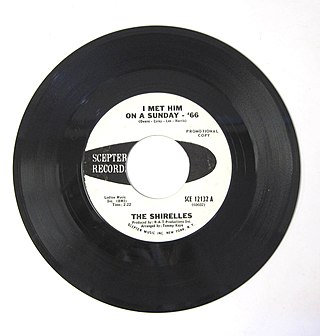
Chess Records was an American record company established in 1950 in Chicago, specializing in blues and rhythm and blues. It was the successor to Aristocrat Records, founded in 1947. It expanded into soul music, gospel music, early rock and roll, and jazz and comedy recordings, released on the Chess and its subsidiary labels Checker and Argo/Cadet. The Chess catalogue is owned by Universal Music Group and managed by Geffen Records and Universal Music Enterprises.

Monument Records is an American record label co-founded in 1958 by Fred Foster. Originally founded in Washington, D.C., the label moved to Nashville, Tennessee in 1960, and experienced success over the next two decades with a number of artists including Roy Orbison, Dolly Parton, Willie Nelson, Ray Stevens, Kris Kristofferson, Charlie McCoy, Boots Randolph, Jeannie Seely and others.

Vee-Jay Records is an American record label founded in the 1950s, located in Chicago and specializing in blues, jazz, rhythm and blues and rock and roll.

Dot Records was an American record label founded by Randy Wood and Gene Nobles that was active between 1950 and 1978. The original headquarters of Dot Records were in Gallatin, Tennessee. In its early years, Dot specialized in artists from Tennessee. Then it branched out to include musicians from across the U.S. It recorded country music, rhythm and blues, polkas, waltzes, gospel, rockabilly, pop, and early rock and roll.

Pye Records was a British record label. Its best known artists were Lonnie Donegan (1956–1969), Petula Clark (1957–1971), the Searchers (1963–1967), the Kinks (1964–1971), Sandie Shaw (1964–1971), Status Quo (1968–1971) and Brotherhood of Man (1975–1979). The label changed its name to PRT Records in 1980, before being briefly reactivated as Pye Records in 2006.
Cadet Records was an American record label that began as Argo Records in 1955 as the jazz subsidiary of Chess Records. Argo changed its name in 1965 to Cadet to avoid confusion with the similarly named label in the UK. Cadet stopped releasing records around 1974, when its artists were moved to Chess.

Scepter Records was an American record company founded in 1959 by Florence Greenberg.

United Artists Records was an American record label founded by Max E. Youngstein of United Artists in 1957 to issue movie soundtracks. The label expanded into other genres, such as easy listening, jazz, pop, and R&B.
Candid Records was a jazz record label first established in New York City.
Bell Records was an American record label founded in 1952 in New York City by Arthur Shimkin, the owner of the children's record label Golden Records, and initially a unit of Pocket Books, after the rights to the name were acquired from Benny Bell who used the Bell name to issue risque novelty records. A British branch was also active in the 1960s and 1970s. Bell Records was shut down in late 1974, and its assets were transferred to Columbia Pictures' new label, Arista Records.
Barnaby Records was an American record company founded by singer Andy Williams in 1963 with his purchase of soon-to-be-liquidated Cadence Records. It held the rights to work by a number of popular music performers including Williams' work before he was with Columbia Records.

Boogity Boogity was Ray Stevens' eleventh studio album, released in 1974, as well as his sixth for Barnaby Records. For this album, Stevens returns to the genres of novelty and comedy. The album was released to capitalize on the success of his hit single "The Streak", which was inspired by the fad of streaking during that time period. Stevens' two songs, "Freddie Feelgood " and "Bagpipes That's My Bag," were taken from his album Gitarzan and were reissued on this album. The front of the album cover shows Stevens running in a blur, seemingly in the nude, and also contains the phrases "Woosh!!" and "Don't look Ethel!" the latter of which is part of the lyrics to the primary single of the album.

The Very Best of Ray Stevens is a collection of 12 previously released singles that were hits for novelty/country artist, Ray Stevens; it was released in December 1975 by Barnaby Records. While this collection has more emphasis on Stevens' hits for Barnaby, it also contains three from the label of Monument Records and two from Mercury Records. The version of "Mr. Businessman" is the single release. "Gitarzan" is the album version that begins with an audience cheering and applauding. "Ahab the Arab" is the original recording that was released by Mercury.
Bill Haley & His Comets recorded many singles and albums. The following list references only their original release and generally does not include compilation albums or single reissues. This list does not include releases on which the Comets worked as session musicians, and primarily focuses on releases during Haley's lifetime.
GRT Records was the name of both a U.S. and a Canadian record label, both created by General Recorded Tape, a California-based company that existed from 1965 to 1979. Their demise was concurrent with the bankruptcy of their owner, General Recorded Tape.

General Recorded Tape was an American manufacturer of reel to reel, 8-track and cassette tapes that existed between 1965 and 1979. The company grew to become the owner of several prominent U.S. record labels, including Chess Records and Janus Records.

"Two Hound Dogs" is a 1955 rock and roll song composed by Bill Haley and Frank Pingatore. The song was released as a Decca single by Bill Haley and His Comets. The Decca single peaked at #31 on the Cash Box singles chart.
Allan Mason is an American record producer and A&R executive.
Oak Records is an independent record label that has released recordings by Ernie Freeman, Doug Gibbs, Five Flights Up, James Talley, Stephanie Winslow, and Dwight Yoakam. It has been releasing recordings since the 1970s.
Marvin Schlachter is a former American record company music executive and record label owner. Schlachter was a founder and owner of Scepter Records, Wand Records, Prelude Records, and helmed a number of high ranking roles at others such as GRT Records, Janus Records, Chess Records and Pye Records US.











